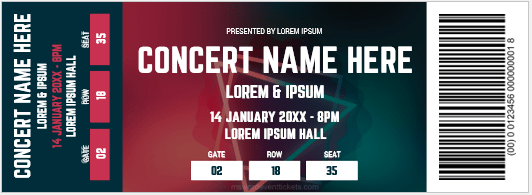A personal finance expert is advising Brits on how they can protect themselves from purchasing fake concert or festival tickets online.
The comments have been released amid a 42% increase worldwide in year-on-year Google searches for ‘ticket fraud’.
With thousands of Brits set to attend at least one concert or festival this year, many may unfortunately fall victim to ticket fraud. Examples of this type of fraud include tickets that never arrive or, if they do, turn out to be fake, leaving you unable to access the festival or concert you’ve been looking forward to.
Dan Whittaker, personal finance expert at Little-Loans.com has shared five red flags that Brits can look out for to avoid buying fraudulent tickets online, as well as what your rights are if you’ve fallen victim to ticket fraud.
- Ensure you buy tickets from a reputable source
“Buy tickets for concerts and festivals from either the venue’s box office, a reputable ticket exchange site, through the promoter, or via an official agent. Check to see if the vendor is a member of the Society of Ticket Agents and Retailers (STAR). Companies registered with STAR act in accordance with strict governing standards and, in the event of anything going wrong, STAR will also help customers resolve any complaints.”
- Be wary of suspicious contact details
“Avoid purchasing tickets from a site where there is only a PO Box address or mobile phone number listed as this can make it difficult for you to get in touch after you have purchased tickets. Mobile phone numbers and PO Box addresses can easily be changed and are difficult to trace. Instead, purchase your tickets from a site where a landline phone number and full postal address is listed.”
- Avoid if there is not a locked padlock on the browser’s address bar
“Before you make any payment for music tickets, ensure that the web address starts with ‘https’. The ‘s’ stands for ‘secure’ and means that any information provided is encrypted. There should also be a locked padlock icon in the browser’s address bar.”
- Steer clear of direct bank transfers
“If you choose to purchase tickets from an individual, for instance on a social media site, you should use a secure payment service such as PayPal, rather than transferring the money directly into their bank account. This way you will be protected by PayPal’s Buyer Protection program, which entitles you to a full refund of the purchase price of the ticket and any additional costs, such as delivery.”
- Does it seem too good to be true?
“If tickets appear to be sold out on well-known sites, or haven’t officially gone on sale yet but a website is claiming to have tickets available, this is likely to be a scam. Fraudsters will take advantage of the huge demand that popular music events attract. Do not purchase tickets from sites which offer to send a ‘customer representative’ to the venue on the day of the event. Although they will claim to supply you with your ticket, it’s more than likely that no one will show up.”
What can I do if I’ve accidentally purchased fake tickets online?
“If you have paid for a fake ticket using your debit card, credit card or via PayPal, your bank can request that the seller’s bank refund the money to your account; this is known as the ‘chargeback scheme.’ If you paid via debit card, regardless of how much you spent on the music tickets, you can use this scheme to ask for a refund.”
“If you paid by credit card and the ticket cost more than £100 (but less than £30,000), you may be able to make a Section 75 claim with your credit card provider. If you paid by credit card and paid less than £100, you will need to use the chargeback scheme instead.”
“If you’ve purchased a fake ticket via bank transfer, you may want to contact your bank to ask if it’s possible to get a refund. If you can’t get your money back, you may wish to seek help from an independent body, such as the Financial Ombudsman Service.”
“Unfortunately, if you’ve paid for fake music tickets via a money transfer service, such as PayPoint, it’s unlikely that you will be able to get your money back. However, I would still encourage you to report the scam to Action Fraud and explore any financial or emotional support that you may require.”
Little-Loans.com has shared these tips to help prevent Brits from purchasing fake music tickets online, as well as general information about your rights to a refund if you’ve fallen victim to the fraudulent practice.

| [donate]
| Help keep news FREE for our readersSupporting your local community newspaper/online news outlet is crucial now more than ever. If you believe in independent journalism,then consider making a valuable contribution by making a one-time or monthly donation. We operate in rural areas where providing unbiased news can be challenging. |



















